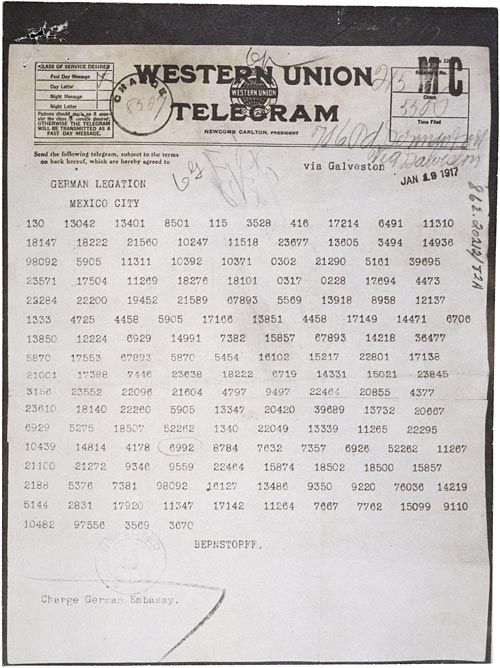
Zimmermann Telegram (1917)
This telegram, written by German Foreign Secretary Arthur Zimmermann, is a coded message sent to Mexico, proposing a military alliance against the United States. The obvious threats to the United States contained in the telegram inflamed American public opinion against Germany and helped convince Congress to declare war against Germany in 1917.
Between 1914 and the spring of 1917, the European nations engaged in a conflict that became known as World War I. While armies battled in Europe, the United States remained neutral. In 1916 Woodrow Wilson was elected President for a second term, largely because of the slogan "He kept us out of war." Events in early 1917 would change that hope.
In January of 1917, British cryptographers deciphered a telegram from German Foreign Minister Arthur Zimmermann to the German Minister to Mexico, von Eckhardt, offering United States territory to Mexico in return for joining the German cause. To protect their intelligence from detection and to capitalize on growing anti-German sentiment in the United States, the British waited to present the telegram to President Wilson. Meanwhile, frustration over the effective British naval blockade caused Germany to break its pledge to limit submarine warfare. In response, the United States severed diplomatic relations with Germany in February.
On February 24 Britain released the Zimmermann telegram to Wilson, and news of the telegram was published widely in the American press on March 1. The telegram had such an impact on American opinion that, according to David Kahn, author of The Codebreakers, "No other single cryptanalysis has had such enormous consequences." It is his opinion that "never before or since has so much turned upon the solution of a secret message." On April 6, 1917, the United States Congress formally declared war on Germany and its allies. The Zimmermann telegram clearly had helped draw the United States into the war and thus changed the course of the war, which ended with an armistice, an agreement in which both sides agree to stop fighting, on November 11, 1918.

